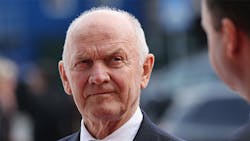Ferdinand Piech vanished from the corporate scene for almost two years after abruptly departing Volkswagen AG, the carmaker his grandfather helped build. Now he’s looking to settle old scores.
Piech, Volkswagen’s former CEO and chairman, and still a key shareholder, has rekindled accusations that top managers knew about rigged diesel engines months before the manufacturer admitted it. The claims, appearing in a Bild newspaper article late on Wednesday, could provide fresh ammunition for investors seeking damages from the company.
Finger-pointing within Volkswagen is escalating as investigators try to determine what role top managers played in the rigging of 11 million vehicles worldwide to falsify emissions test results. Piech, 79, a scion of the billionaire Porsche-Piech clan that controls 52% of VW’s voting stock, had been largely absent from public wrangling after losing a power struggle with then-CEO Martin Winterkorn five months before the scandal broke.
The diesel crisis has already cost the automaker more than $23 billion in fines, buybacks and other charges.
Volkswagen rebuffed Piech’s accusations late on Wednesday, stating that the former chairman already made those claims in an independent investigation last year, but that they had at the time been “classified as implausible” by examiners at U.S. law firm Jones Day.
“The board of management will carefully weigh the possibility of measures and claims against Mr. Piech,” Volkswagen’s supervisory board said in the statement, hinting that it could file a criminal complaint against him for false testimony. The company declined to elaborate as investigations are ongoing.
Angry Investors
While Winterkorn was forced to step down in disgrace once the cheating became public in September 2015 and management was reshuffled, few of the company’s top executives have so far been directly implicated.
Volkswagen lost more than 40% of its market value in the weeks after the cheating became known. Investors in the U.S. and Europe have filed lawsuits, arguing that they lost money because the company was too slow in disclosing the issue. Volkswagen’s defense has been that top managers didn’t know the extent of the problem, so any evidence to the contrary, from a former insider with Piech’s standing, could weaken their argument.
Germany’s Bild reported Wednesday that Piech told German prosecutors in Braunschweig that after learning about possible cheating on VW’s diesel engines in February 2015, he informed Winterkorn and subsequently supervisory board members, including Stephan Weil, prime minister of the German state of Lower Saxony, works council chief Bernd Osterloh, former IG Metall union head Berthold Huber and Wolfgang Porsche. Piech stepped down as chairman in April 2015.
“We find it hard to follow the logic behind Piech’s allegations,” Arndt Ellinghorst, a London-based analyst at Evercore ISI, said in a note to clients. “Why did he claim to have only informed four individual members of the board and not the entire board, which would have been his duty as chairman?”
Last month, German prosecutors extended a criminal probe of Volkswagen’s diesel-emissions cheating to Winterkorn as they almost doubled the number of people being investigated in the scandal to 37. Winterkorn is already among VW executives targeted in a separate probe of market manipulation. Weil and other VW supervisory board members aren’t under investigation, prosecutors in Braunschweig said in an e-mailed statement on Thursday. They declined to elaborate further as the probe is still ongoing.
Winterkorn, in his first public appearance since being forced to resign, told a parliamentary committee in Berlin in January that he wasn’t aware of the cheating and that he would have put an end to it if he’d known.
“Plain Wrong”
Weil reiterated in a statement that he only learned about the manipulation on Sept. 19, 2015. “Any other description is plain wrong,” he said. A spokesman for Wolfgang Porsche referred to the statement by VW’s supervisory board. Huber and Osterloh said in a joint statement that Piech’s allegation “is untrue.”
“We expect that the management board examines in due course if it needs to take actions against Piech,” Huber and Osterloh said.
Piech’s own role remains unclear. According to the U.S. Department of Justice — and signed off by VW — the cheating roots back to at least May 2006. Piech ousted Winterkorn’s predecessor as VW CEO, Bernd Pischetsrieder, that year. The departure came several months after VW shot down talks over a far-reaching alliance with Daimler AG which would have given VW access to its German peer’s diesel technology, people familiar with the matter said last month.
Piech’s authoritarian management style and thirst for acquisitions helped Volkswagen grow from a struggling manufacturer into a global automotive powerhouse that outsold Toyota Motor Corp. last year to become the world’s biggest carmaker.
The exact reasons behind the fallout between Winterkorn and Piech remain unclear. While the two engineers shared an obsession with detail and had worked together closely for decades, Piech started to publicly challenge the CEO in 2015 and dismissed him as a potential successor to the chairmanship. The spat continued even after other board members backed Winterkorn.
By Christoph Rauwald and Karin Matussek
About the Author
Bloomberg
Licensed content from Bloomberg, copyright 2016.
